
Interview with Fernando Alonso
Atlas F1 Magazine Writer
Tipped to be Formula One's next 'big one' by many, Fernando Alonso wears his crown lightly. Despite his shy attitude, after two pole positions, four podium finishes, and a race win at the record age of 22, the Spaniard has made the Formula One paddock sit up and pay attention. Atlas F1's David Cameron talked to the man who is likely to carry us into the next generation of drivers
Fernando Alonso wears this crown lightly. Quiet and self effacing, in person he comes across as someone who is intrinsically shy but has spent years trying to put this malady behind him. His walk is all in the shoulders, and he rolls on the sides of his feet as though on egg shells, and when he shakes your hand he immediately looks down before looking back up again, looking you in the eye as thought taught to do so.
Pat Symonds worked with both drivers, as race engineer to Schumacher and in his current position as Director of Engineering at Renault. He's heard the comparison before, of course, but thinks the difference is that Schumacher possibly concentrates on things more, concentrates on numbers and degrees and angles. "Maybe, maybe - I concentrate on the things that I feel are important!" Alonso laughs at the idea, "the other ones are for the engineers, not for me! (Michael and I) are different, like all people."
But like Schumacher before him, Alonso has made the Formula One paddock sit up and pay attention in only his second year on the grid. After a learning year at Minardi and another as test driver for Renault, Alonso stepped up to the plate, becoming the youngest pole sitter and race winner in the history of the World Championship. Alonso's year was, quite simply, a cut above anything anyone thought it would be, himself included. "Yes - of course! But I think we worked very well, the car is working well, and everything was perfect this season."
"You think these people are fantastic, they are very quick and very good. But when you are at Renault you don't think that; you have enough confidence, and if one guy does the pole you think that you can do that too. You have more confidence in yourself, because the car is fantastic."
DC: At the start of the year what were you hoping for? When you knew you were driving for Renault, what was it that you wanted to achieve?
Alonso: "I was not really thinking anything, I was just concentrating to improve the car during the winter and to have the best possible car in the races. I knew that it was difficult to fight with the top teams - Williams, Ferrari, McLaren - but maybe we were thinking to be around seventh, eighth position for the races, and for me to have maybe ten points, fifteen points at the end of the year."
DC: When you first got into the new car did you just sit there and think 'wow - this is much better than I thought'?
Alonso: "Not really, not really. It was quite similar to last year's car, but then with the new engine and new pieces in the car in the first race in Australia when we put everything in the car it was a big change, and even from the first race we knew that the car was competitive basically everywhere."
DC: You said it was similar to last year's car, and you put a lot of miles into last year's car, but what was the difference? The results are a lot different.
Alonso: "Yeah probably the aero package that we put in, in Australia - and another step in Silverstone - was the biggest difference. In terms of the chassis, when we test the new car we test basically the chassis with all of the aerodynamics, and it was similar to that."
The engine has been a problem for the team, and a lot of work has been done over the year to bring step improvements, but the radical wide angled engine Renault believed would push them up the grid hasn't lived up to expectations. With the new one engine per weekend rule coming into play next year the team may have an opportunity to make up that lost ground.
DC: What are you expecting from the new rules next year?
Alonso: "Yeah, we don't know. We are working on a new concept of engine, more traditional V angle, and we are quite confident to have a good engine. We don't know because Formula One is always difficult, but I think it will be a good year for Renault - maybe it's the next step, and maybe we are more regularly fighting for victories next year."
And then there's Alonso's teammate, Jarno Trulli.
Trulli is the mystery man of Formula One - on his day he seems to be untouchable, and yet other days he looks in need of a nap. But how hard is it for Alonso to beat Trulli? "Very hard!" Alonso laughs, his hands waving in front of him as if in surrender. "Yeah he's very quick, and it's very hard. But you know, I was lucky this year to have a good car and to beat him in some places and to have more points than him. But anyway it was a difficult year and I learnt a lot of things from him as well, because like you say he's very quick and you have to really push to the limit in some places to beat him."
DC: You and Jarno seem to get on fantastically - I've seen you together and you look almost like brothers.
Alonso: "Yeah, it's good because basically we spend most of the year together with the testing, the races, and the physical training. At the end of the year you have your teammate in the truck who is also your competitor, your first competitor, because he has the same car and you have to beat him first. But outside of the car it's not a problem to be normal friends, to play football together, to go to the hotel in the same car - you know, it's a normal relationship."
Alonso: "Yeah, it was a little bit of bad luck in some places when … (laughs) … these things happen."
Alonso's year has been so impressive that it's sometimes hard to remember that he is only 22. Young drivers have a tendency to be wayward, to make rookie mistakes, but with the Spaniard these have been few and far between this year - speeding under yellow to get back to the pits in Brazil which lead to his big crash and the dice with David Coulthard notwithstanding. Renault made a good decision in pairing him with Trulli, who now has over one hundred Grand Prix appearances to his name.
So what has Alonso learnt from Trulli? "I don't know really - to be quick, I guess, because, you know, he is really quick on all the tracks, in all the conditions, and there is not any time to breathe! You have to always be on the maximum in order to be competitive and near his time and lap. The first thing that I learnt from him, and the first surprise that I had this year, was the level of competition that he has in himself - it's very powerful.
DC: What about the other way around? Has Trulli learned anything from you?
Alonso laughs. "I don't know - I don't think so! But I learnt many things this year - to save the car a little bit in important moments like in tyres, engine, gearbox, etc, etc, and then to push to the limit - I said before with Jarno I have to push really hard in some places to beat him. And to be at this level always, in all the circuits and in all the test sessions and in all the free practice - this was new to me, to be at this level."
DC: I don't know how you evaluate your own driving - do you look at it and say 'maybe I could do this a little better, maybe I could try that'?
Alonso: "Yeah, always we look at the telemetry and compare to Jarno basically, and see that we can do different things in the corner and change a little bit, brake a little bit later or brake with less pressure to keep more speed into the corner - you always change your driving style like this."
DC: And when you're not with the team? Do you sit and think about things that you do when you're driving?
Alonso: "Never."
DC: No? Why not?
Alonso: "When I am with the team, I work with the car and with the team. When I am not with the team, I have other things to do!"
DC: So what would you say is your strongest point?
DC: How about your weakness?
Alonso: "Oh, experience. I am twenty two, so maybe I need more experience, and I need to fight with the top guys more wheel to wheel - probably that I'm not at 100% now."
Alonso smiles bashfully when he says that he's not at his one hundred per cent, but he probably knows just as well as the rest of the paddock that it won't be long before he dominates the sport, perhaps even in similar fashion to the German six times World Champion that Alonso is so often compared to. And just like Schumacher, Alonso too won his first race in only his second season in Formula One.
The win at the Hungarian Grand Prix, however, did not come to Alonso from luck or clever strategy. He was simply the man of the weekend, with the perfect package and untouchable pace throughout the race. Yet Alonso doesn't seem to put much importance on that win.
"I was very happy to win," he says, "but for me it was another race - it doesn't matter what the result you achieved. Maybe in ten years you remember that race, but now (every) fifteen days there is the next one! Then you start testing for the following year, so there's no time to think."
Indeed, with winter testing underway, a fitness camp in Kenya, Africa, this month and the launch next month, Alonso has little time to reminisce. But looking ahead, he is confident the only way for him and the team is up.
"I hope to fight for more victories next year," he concludes. "The team is fighting very hard, the new chassis is in the wind tunnel with a good result, and the new engine should be better. Also the team will be basically the same, so we know perfectly the way to work with the engineers, with the team.
"So I think we will close the gap with the top teams again, and we can beat them in some of the circuits. I'm really looking forward to next year; it should be good."
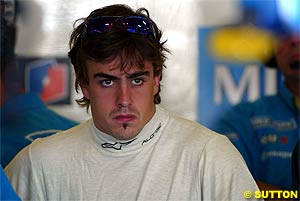 They say he's the next great one, the next one to come in and shake up the sport, the one that will carry us into the next generation of drivers. They say he's the new Schumacher, and you can see why: he drives for the team that brought the German to the fore in its previous incarnation; he came into the sport around the same age and with the backing of a large manufacturer; he started with a small team before moving towards the front; he's bringing the team in around him, wrapping himself in the blanket of them; and he's the key to the viewing public in a European country that has so far been resistant to Formula One's charms.
They say he's the next great one, the next one to come in and shake up the sport, the one that will carry us into the next generation of drivers. They say he's the new Schumacher, and you can see why: he drives for the team that brought the German to the fore in its previous incarnation; he came into the sport around the same age and with the backing of a large manufacturer; he started with a small team before moving towards the front; he's bringing the team in around him, wrapping himself in the blanket of them; and he's the key to the viewing public in a European country that has so far been resistant to Formula One's charms.
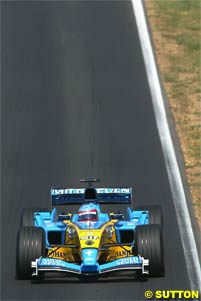 It seems a lot longer, but it was only two years ago that Alonso was propping up the rear of the field at Minardi. It's clear that the move to Renault was a huge jump forward, but what are the main differences between the teams? "A lot; everything!" Alonso blurts out, spreading his hands wide on the table in front of him. "Basically the results and the confidence you have in yourself. When you are at Minardi you have no results, and you sometimes have doubts about yourself when you are 18th or 19th and you see the pole position maybe five seconds in front of you.
It seems a lot longer, but it was only two years ago that Alonso was propping up the rear of the field at Minardi. It's clear that the move to Renault was a huge jump forward, but what are the main differences between the teams? "A lot; everything!" Alonso blurts out, spreading his hands wide on the table in front of him. "Basically the results and the confidence you have in yourself. When you are at Minardi you have no results, and you sometimes have doubts about yourself when you are 18th or 19th and you see the pole position maybe five seconds in front of you.
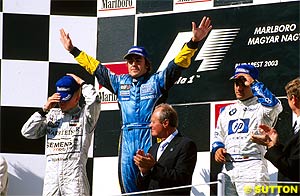 The one weakness the team had was clear to all. "I think the engine is the biggest one, because we are a little bit down on power. But we have a very light engine, a very low centre of gravity, so in the end the engine is a good compromise on some circuits. And a little bit more in the chassis side, to have a little more downforce - I think we are not too far away compared with the top teams."
The one weakness the team had was clear to all. "I think the engine is the biggest one, because we are a little bit down on power. But we have a very light engine, a very low centre of gravity, so in the end the engine is a good compromise on some circuits. And a little bit more in the chassis side, to have a little more downforce - I think we are not too far away compared with the top teams."
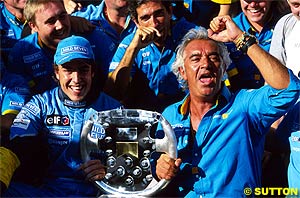 DC: You always seemed to have all the good luck and he always seemed to have all the bad luck - I don't know what that is.
DC: You always seemed to have all the good luck and he always seemed to have all the bad luck - I don't know what that is.
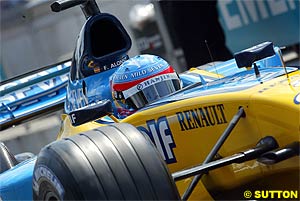 Alonso: "Consistency! I am very, very constant. Basically it doesn't matter if it's raining, not raining, could be a high speed track, slow track, I think I am still competitive in all the places. I am not a driver for qualifying, I am not a driver for the race, I am not a driver for wet conditions - I think I am quite constant in all these places."
Alonso: "Consistency! I am very, very constant. Basically it doesn't matter if it's raining, not raining, could be a high speed track, slow track, I think I am still competitive in all the places. I am not a driver for qualifying, I am not a driver for the race, I am not a driver for wet conditions - I think I am quite constant in all these places."
Please Contact Us for permission to republish this or any other material from Atlas F1.
